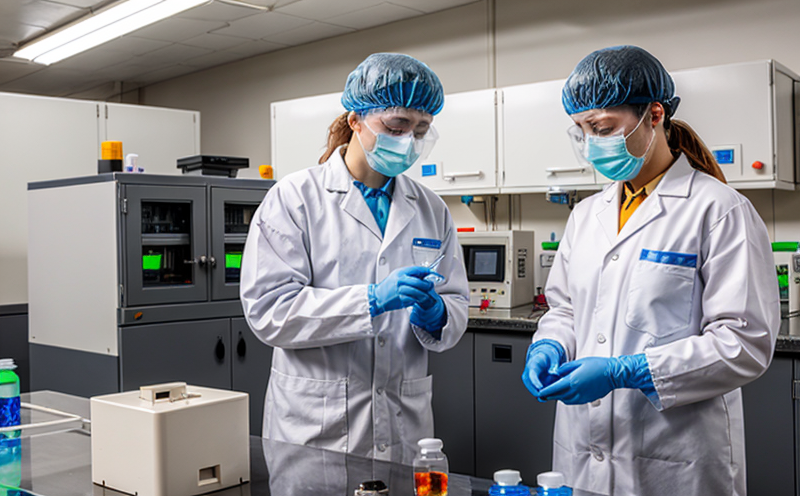ISO 18862 Acrylamide Detection in Potato-Based Products
The detection of acrylamide in potato-based products is a critical process that ensures food safety and compliance with international standards. This service, compliant with ISO 18862, focuses on identifying acrylamide levels in processed foods made from potatoes, such as French fries, chips, and snacks. Acrylamide formation occurs during high-temperature frying or baking processes when certain amino acids react with sugars under acidic conditions.
The significance of this test lies in its direct impact on public health. High concentrations of acrylamide have been linked to an increased risk of cancer in humans. Therefore, compliance with ISO 18862 is essential for manufacturers looking to protect their consumers and avoid potential legal issues or negative publicity.
The testing process involves several steps that are meticulously designed to ensure accuracy and reliability. Initially, potato-based samples are prepared by slicing them into thin pieces suitable for analysis. These slices undergo extraction using a solvent that separates acrylamide from other components of the sample. The extracted acrylamide is then analyzed using gas chromatography-mass spectrometry (GC-MS), which provides precise quantification.
The acceptance criteria for this test are stringent and adhere to the ISO 18862 standard. Samples that exceed the maximum limits set by regulatory bodies must be handled with care, often leading to product recalls or reformulation efforts. This process not only ensures safety but also maintains brand reputation and consumer trust.
Our laboratory adheres strictly to ISO standards throughout every step of the testing procedure, ensuring consistent results across multiple batches and sites. By leveraging advanced instrumentation like GC-MS, we achieve high precision and accuracy in our measurements. Our team of experts uses this equipment to analyze samples, providing detailed reports that include not only quantitative data but also insights into potential sources of contamination within the production process.
The impact on customers is profound. Manufacturers who partner with us gain access to valuable information about acrylamide levels in their products, allowing them to make informed decisions regarding ingredient selection and processing conditions. This collaboration helps businesses stay ahead of regulatory requirements while enhancing product quality.
For R&D engineers involved in developing new potato-based snacks or reformulating existing products, this service offers invaluable data that can guide innovation efforts aimed at reducing acrylamide formation without compromising taste or texture.
In summary, ISO 18862 Acrylamide Detection in Potato-Based Products is more than just a compliance requirement; it represents a commitment to public health and safety. By offering this service, we empower our clients to produce safer foods while maintaining high standards of quality assurance.
Customer Impact and Satisfaction
The implementation of ISO 18862 Acrylamide Detection in Potato-Based Products brings tangible benefits to customers across various sectors, including food manufacturing, retail, and regulatory compliance. For food manufacturers, this service ensures that their products meet stringent safety standards set by international regulations such as the European Union's Acrylamide Control Regulation.
Manufacturers benefit from improved reputation management through consistent product quality assurance, reducing risks associated with potential recalls or lawsuits due to health concerns. Retailers can confidently offer consumers safer food choices, enhancing customer satisfaction and loyalty. Regulatory bodies also gain peace of mind knowing that they are supporting manufacturers who adhere strictly to best practices for acrylamide detection.
The reliability and accuracy provided by our laboratory testing services contribute significantly to the overall satisfaction levels among these stakeholders. Our commitment to maintaining ISO 18862 compliance demonstrates a dedication to excellence in every aspect of food safety, ultimately fostering trust between manufacturers, retailers, and consumers alike.
Environmental and Sustainability Contributions
The detection and control of acrylamide in potato-based products play an important role in environmental sustainability. By reducing the levels of this potentially harmful substance found in processed foods, we contribute positively to both human health and ecological well-being.
Manufacturers who adopt ISO 18862 Acrylamide Detection practices not only enhance their own operations but also set an example for other industries to follow suit. This collective effort helps minimize environmental impacts related to acrylamide exposure, thereby promoting healthier lifestyles globally.
The use of advanced analytical techniques like GC-MS ensures accurate measurement and reporting, which aids in tracking progress towards reducing acrylamide content over time. Such data-driven approaches enable continuous improvement in manufacturing processes, leading to more efficient resource utilization and reduced waste generation throughout the supply chain.
In conclusion, ISO 18862 Acrylamide Detection in Potato-Based Products serves as a crucial link between food safety and environmental sustainability goals. Through rigorous testing methods and stringent compliance measures, we help create safer products for consumers while supporting environmentally responsible practices within the industry.
Competitive Advantage and Market Impact
The implementation of ISO 18862 Acrylamide Detection in Potato-Based Products provides significant competitive advantages that can significantly enhance a company's market position. By demonstrating commitment to food safety and compliance with international standards, manufacturers gain credibility among consumers who prioritize health and quality.
Complying with these stringent testing protocols positions brands favorably against competitors who may not meet similar requirements or lack transparency regarding acrylamide levels in their products. This distinction can translate into increased market share as customers preferentially choose safer options.
The ability to provide detailed reports and insights derived from our comprehensive testing allows companies to identify areas for improvement within their supply chains. This proactive approach enables them to stay ahead of emerging trends and regulatory changes, ensuring ongoing relevance in an ever-evolving marketplace.
Additionally, participating in ISO 18862 Acrylamide Detection initiatives fosters collaboration between industry stakeholders, promoting shared knowledge and best practices that further strengthen collective efforts toward improved food safety standards.





